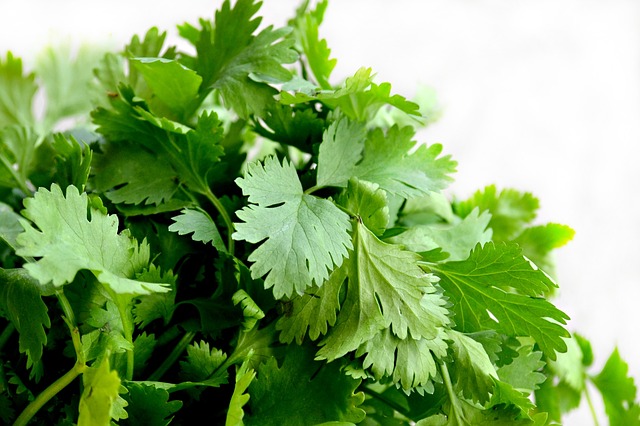Coriander is an aromatic herb that has been used as a flavouring agent and medicinal plant since ancient times in Ayurveda, Chinese medicine and Western herbalism mainly to treat digestive complains.
It was also prescribed with great success as an aphrodisiac for both men and women.
Today, coriander preparations are used by herbalists for digestive conditions such as impaired digestion, flatulence, stomach ache and loss of appetite (including in anorexia).
More recent applications of coriander are in chelation treatments i.e. removing heavy metals such as mercury, lead and aluminium from the body. We are all exposed to toxins every day in the air, in water and in chemical cleaners, to name a few.
Over time, these metals can accumulate and may disrupt the natural flow of a number of body systems. It’s especially indicated after the removal of amalgam dental fillings when the body is ‘flooded’ with mercury.
Chelation therapy is used to remove heavy metals and excess minerals from the body by specific chemical compounds and by consuming herbs or other supplements that bind to the metals.
Originally, it was used as a medical treatment for those suffering from lead and/or mercury poisoning. Currently, it is a natural health practice used in the treatment of heart disease, stroke and autism, among others.
The Autism Treatment Centre of America cites one frequently referenced study by Dr Yoshiaki Omura of the Heart Disease Research Foundation from 1995, where researchers found that coriander accelerates the excretion of mercury, lead and aluminium from the body.
Another study by M. Aga, et al, published in the “Journal of Ethnopharmacology” in October of 2001, investigated the effects of coriander on mice with high levels of lead in their bodies.
Another chelating agent, DMSA, was used as a control to validate the results of the experiment. After 25 days levels of lead were significantly decreased by coriander suggesting that it has lead chelating activities.
It needs to be noted that gentle chelation therapy by eating coriander is relatively safe for most people; however, some individuals who have high levels of heavy metals in the body tissues need to be closely monitored by a knowledgeable health professional in case large amounts of toxins are released in a short period of time.
These toxins can overwhelm the body’s detoxification systems and cause potentially serious poisoning.
Coriander is full of vitamins and minerals and is particularly rich in vitamins A and K, it also contains vitamins B, C and E. As for the mineral content, coriander is high in potassium and is also a good source of calcium, magnesium and phosphorous.
The seeds are used as an ingredient of curry powders, pickles, pickling spice, baked foods, sausages and sauces. Chewing the seeds after eating garlic can freshen the breath.
So include and enjoy coriander in your diet on a regular basis to reap the many benefits! Here are two simple and yummy recipes for you to start with:
Basic Coriander Pesto
- 1-2 cloves of garlic
- 1 firmly packed cup of coriander
- 2 tablespoons of lemon juice
- 4-6 tablespoons of olive oil
- Celtic salt to taste
- Small dash of cayenne pepper
Process coriander and olive oil in a blender until chopped. Add the garlic and lemon juice and mix until the mixture is finely blended into a paste. Store in a dark glass jar in the fridge, use within a week. It can also be frozen in ice trays and use in small portions as needed.
Other options – you can add nuts such as pine nuts, macadamia or Brazil nuts, pumpkin and sunflower seeds, or an equal amount of fresh parsley for additional benefits especially to increase vitamin C content and support detoxification through the kidneys.
Spicy Coriander Butter
- 125 grams of softened, unsalted, organic butter (1/2 block)
- 3-4 cloves minced garlic
- 4 generous tablespoons chopped fresh coriander (or blended lightly)
- 1 small chili seeded and finely chopped (medium hot)
- 2-3 teaspoons fresh lime juice
- 1 teaspoon lime zest
- Celtic salt to taste
Blend all together. Great to have with grilled fish, steak, rice, and steamed vegetables. Coriander loses its flavour quickly when cooked, so add it just prior to serving.






